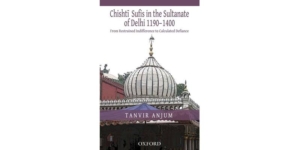 When the shrine of Baba Farid Ganj Shakar in Pakpattan was attacked last year, the real significance of the incident was not fully understood. Baba Farid is a leading figure of the Chishti Sufi order that has played a major role in developing Sufi establishments ( khanqahs) as inclusive and multifaith spaces of spirituality and meditation in medieval India.
When the shrine of Baba Farid Ganj Shakar in Pakpattan was attacked last year, the real significance of the incident was not fully understood. Baba Farid is a leading figure of the Chishti Sufi order that has played a major role in developing Sufi establishments ( khanqahs) as inclusive and multifaith spaces of spirituality and meditation in medieval India.
Tanvir Anjum’s book is an elaborate treatise on how the Chishti Sufis could create and sustain those spaces, sometimes in the face of opposition and suppression from the state.
It is rare to find Pakistani scholars or writers exploring Sufism, which is central to belief systems and worship practices in Pakistan and is perhaps a socially-embedded bulwark against exclusivist ideologies that have flourished of late due to state patronage. Anjum’s work, therefore, is a welcome addition to the meagre body of Pakistani writings on Sufism. The book is based on her doctoral dissertation and, therefore, its tone and structure are academic.
This can be a major drawback for non-academic readers but fortunately Anjums style compensates with a direct and uncomplicated narrative. Anjum’s central focus is on the relationship between the Chishti Sufis and the Delhi Sultanate.
Given the large number of their followers, Sufi establishments were putative centres of power a fact that the Delhi sultans could not ignore as their own rule was partly dependent on sources of public approval. The cooption or submission of the Sufis was vital for them to sustain their rule. The Chishti Sufis, however, purposely stayed away from the centres of power to retain their independence and people-oriented ethos. This is not to say that all Sufi orders have always steered clear of the state. The Suharwardys, for example, were not averse to accepting favours from the state. They, in fact, upheld a policy of cordial engagement with the state.
As Anjum’s narrative takes us through the evolution of the Chishti order in the subcontinent, we learn about critical moments when the state attempted to encroach on the Sufis interactions with the people and the manner in which they resisted such attempts during the 13th and the 14th centuries to retain the essence of their message. The books first six chapters outline the various strategies employed by Sufi leaders to negotiate challenges to their independence from the sultans. The last two chapters trace the evolution of inherited spirituality (sajjada nasheeni) and make some incisive comments about its relationship with the state. Like, for instance, towards the end of the 14th century and through the later eras, biological descendants of the founders of Sufi establishments were not as resilient as their forefathers and, therefore, were unable to remain indifferent or defiant towards the rulers as much as their ancestors could.
Much of the criticism of Sufi orders today relates to the practices at shrines and the way in which the inheritors of Sufi shrines play politics and are linked to power. Their contemporary conduct is certainly in conflict with the teachings of their great forefathers and hence essentially not Sufism.
Chisht? Sufis in the Sultanate of Delhi 1190-1400
Tanvir Anjum
Hardback, 452 pages, March 2011
ISBN: 9780199060092
Price: Rs.1,200.00



